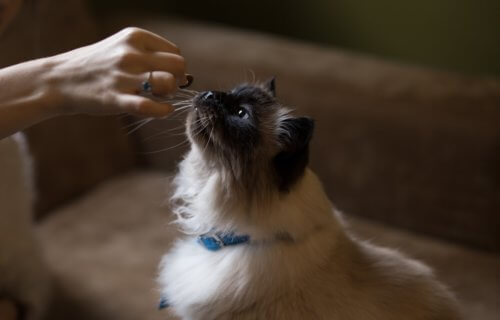EXETER, United Kingdom — Cats, even domesticated house cats, are predators and hunters by nature. So it isn’t surprising that many domestic cats routinely catch and kill nearby mice, rats, and birds. However, are our feline friends actually killing these animals because they want a fresh meal? According to a new study, the answer is no. In fact, cats would rather opt for the free meal instead of putting in the work.
To reach these conclusions, researchers from the University of Exeter forensically analyzed a group of cats’ whiskers to determine what they had been eating. The findings reveal that 96 percent of the cats’ diets came from food their human owners provided. Wildlife made up the extra four percent. Study authors say these results show that cats are driven to hunt wild animals out of instinct not hunger.
“When food from owners is available, our study shows that cats rely almost entirely on this for nutrition,” says Dr. Martina Cecchetti, of the Environment and Sustainability Institute on Exeter’s Penryn Campus, in a university release. “Some owners may worry about restricting hunting because cats need nutrition from wild prey, but in fact it seems even prolific hunters don’t actually eat much of the prey they catch. As predators, some cats may hunt instinctively even if they are not hungry – so-called ‘surplus killing’ – to capture and store prey to eat later.”
A meaty diet can help ‘scratch that itch’
Each cat analyzed for this study had a single whisker trimmed once at the beginning of the research and again at the end. From there, the team analyzed stable isotope ratios in the whiskers. This allowed researchers to identify the origins of recently ingested proteins. All of the cats were known-hunters who had recently (and frequently) caught wild animals around their home.
This study also tested the effectiveness of various supposed methods of curbing hunting behavior in domestic cats. Methods tested include bells, “Birdsbesafe” collar covers, a meat-rich diet, providing food via a puzzle feeder, and regular play. Cats fitted with a Birdsbesafe collar did end up eating less wild animals, probably due to catching fewer birds.
“This study reassures owners of cats who hunt that the motive to hunt is instinctive, not driven by nutritional needs,” explains Susan Morgan, Chief Executive of Songbird Survival, which sponsored the study. “Furthermore, pet owners can help us reverse the shocking decline in songbirds via three simple, ‘win-win’ steps: fit collars with a Birdsbesafe cover; feed cats a premium meaty diet; play with cats for five to ten minutes a day to ‘scratch that itch’ to hunt.”
“In the UK, we’ve lost half our songbirds in 50 years, but we can all help to stem this tide,” she concludes.
The study is published in the journal Ecosphere.
